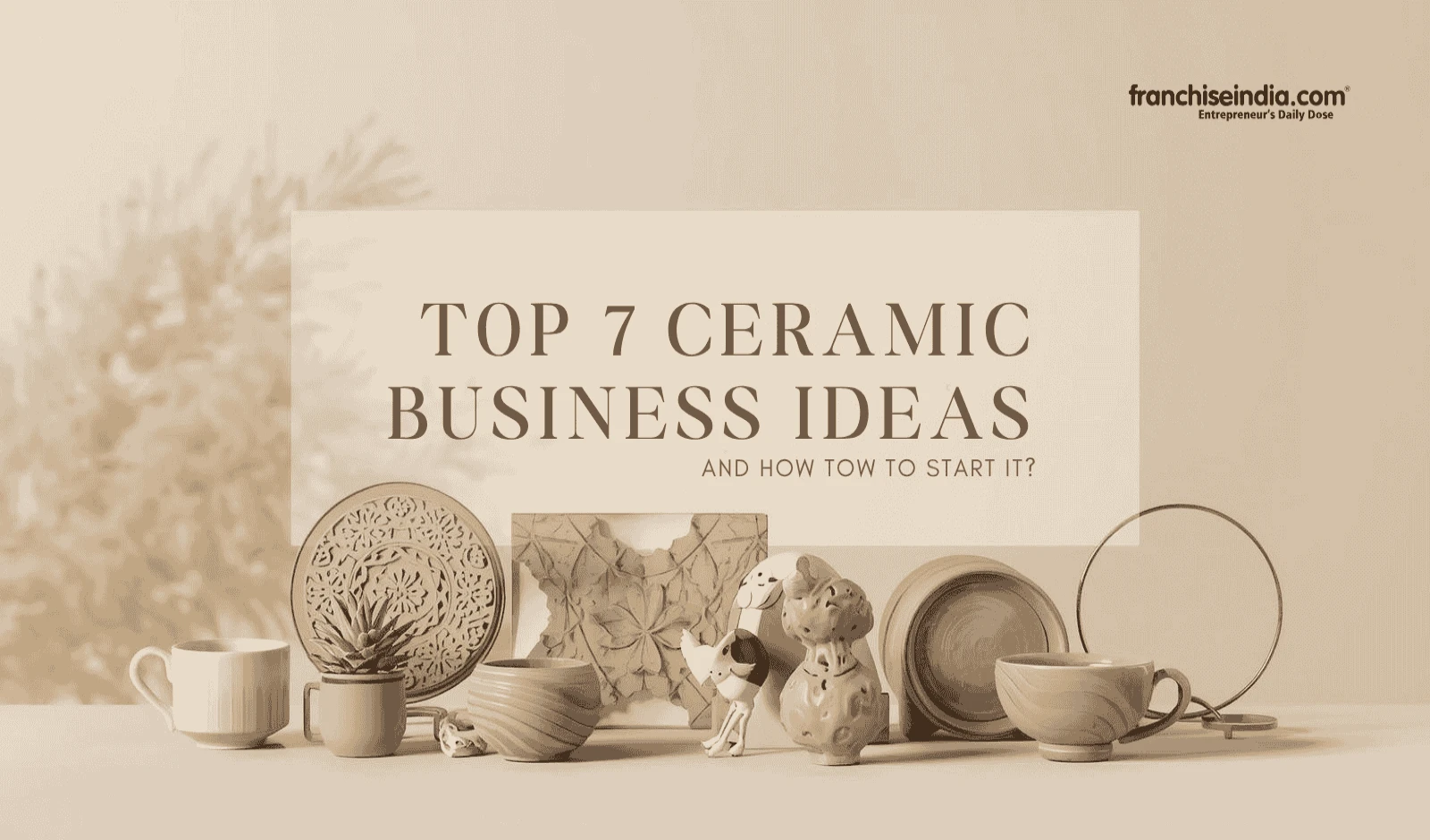
For entrepreneurs, this diversity means there’s a ceramic business idea for every budget, from the low-investment, high-margin artisanal studio to the high-capital, high-volume manufacturing plant. The profitability of this business sector is fuelled by the construction boom and the experience economy. More than being a traditional industry, this stands at the intersection of industrial necessity, artistic expression and sustainable living. This comprehensive guide explores the seven most lucrative ceramic business ideas.
Also read: Flooring benefits with Euro Ceramics
.png)
1. Artisanal and Studio Pottery (D2C Model)
Consumers of today are gravitating towards one-of-a-kind, organic, flawed, and narrative tableware instead of mass-produced items. Artisanal pottery focuses on high-quality, handcrafted mugs, planters, vases, and kitchenware on the demand for slow living and true handicraft. This approach succeeds at large profit margins because the value is derived from artistic skill, not just material cost.
Investment:
The investment for this is low to medium. It typically ranges between ₹3 lakhs to ₹10 lakhs.
How to Start:
First, build your skill and master the basic throwing, glazing, and firing techniques. You can set up a small, dedicated studio space with proper ventilation for firing.
Price based on time, skill, and uniqueness, not just material weight. Aim for margins of 200% to 400% over the cost of materials and labour.
2. Specialty & Custom Ceramic Tile Manufacturing
The mainstream tile business is intensely competitive, but the speciality tile market demands unique, custom, or environmentally friendly goods. This company focuses on high-end, small-batch tiles that offer specific aesthetic or technical benefits.
Investment:
The investment for this is high. It typically ranges between ₹1 crores to ₹5 crores+.
How to Start:
You can start by deciding your niche. Your primary customers are architects, interior designers, and high-end construction firms. Obtain necessary BIS (Bureau of Indian Standards) certifications.
Partner with 1−2 leading architectural firms to secure initial large-scale orders and build a portfolio of impressive case studies.
Also read: 5 Biggest Mistakes First-Time Franchise Investors Make
3. Technical Ceramics for Industrial Applications
Technical ceramics (also known as advanced ceramics) are non-metallic, inorganic materials used in harsh environments where metals fail. They provide excellent electrical insulation, toughness, and heat resistance. Automotive components, electrical insulators, defence, and medical devices are important markets. This is a high-entry-barrier, high-profit B2B business.
Investment:
The investment for this is very high. It typically ranges between ₹3 crores to ₹10 crores+.
How to Start:
This business relies entirely on meeting exact client specifications. Invest heavily in rigorous testing and third-party verification to prove the material's performance under stress. Focus on one specific advanced material; it requires specialised knowledge.
Once a client validates your product, the relationship is typically based on long-term supply contracts, ensuring stable, high-volume revenue streams.
4. Ceramic Tableware Rental and Subscription Services
The event and wedding industries often require large volumes of visually appealing, high-end dinnerware for single use. It is quite profitable to rent out carefully chosen, high-end ceramic place settings that are extremely successful. The return on a fixed inventory is maximised by this model.
Investment:
The investment for this is medium. It typically ranges between ₹15 lakhs to ₹30 lakhs. The major cost is bulk purchase of diverse, high-quality, durable ceramic inventory adn insurance.
How to Start:
Initially source inventory that is durable, chip-resistant commercial-grade ceramics. The core operation is impeccable logistics. Develop a system for efficient packing, safe transport and rigorous inspection after every event.
You can directly market it to wedding planners, high-end caterers, and corporate event managers rather than individual clients.
Also read: Your guide to a low-cost franchise in 2025
5. DIY Ceramic Kits and Educational Workshops
The urge for creative activities skyrocketed following the epidemic. This company takes use of the "experience economy" by providing all the materials and guidance needed for home-based ceramic painting or basic clay hand-building. Workshops pay well per hour, whereas kits provide a scalable, passive income stream.
Investment:
The investment for this is low. It typically ranges between ₹2 lakhs to ₹5 lakhs. The major cost is for inventory of pre-fired bisque, acrylic/underglaze paints, brushes, and packaging materials for kits etc.
How to Start:
You can create curated kits like a mug painting kit or a beginner planter kit. Write clear, attractive instructions and include high-quality, non-toxic glazes. You can partner with cafes, community centres, or corporate HR departments to host high-volume, on-site "sip and paint" events, outsourcing the venue and client acquisition.
Ensure they are lightweight, protective packaging to minimise shopping costs and prevent damage to delicate bisque items.
6. Sustainable Ceramic Filter Manufacturing
With increasing concerns over drinking water quality, particularly in rural and semi-urban regions, there is a considerable need for cost-effective water treatment technologies. Clay, sawdust, and colloidal silver are frequently used to make ceramic water filters, and environmentally friendly solution to remove sediment and bacteria. This is a business with a clear social impact.
Investment:
The investment for this is medium. It typically ranges between ₹30 lakhs to ₹60 lakhs.
How to Start:
Start with R&D and testing. You can work with a university lab or consulting firm to validate the material blend and gain certificates. Target large-scale procurement from NGOs, municipal bodies, and government schemes.
You can focus on locally sourced, abundant raw materials to keep the price of the final product competitive.
7. Ceramic Jewelry and Fashion Accessories
Ceramic jewellery (beads, pendants, and earrings) is lightweight and extremely durable and offers colors and textures that metal or plastic cannot replicate. This is a low-volume, high-margin artisanal fashion business ideal for launching and testing market demand online.
Investment:
The investment for this is low. It typically ranges between ₹2 lakhs to ₹5 lakhs.
How to Start:
Initially focus on a specific aesthetic and master the technique of securely bonding ceramic pieces with metal findings using industrial-grade epoxy.
After this you can partner with fashion and lifestyle influencers who align with your aesthetic to showcase the unique texture and colour using platforms like Instagram and Pinterest. Invest in premium, eco-friendly packaging.
Also read: Franchise vs Starting from Scratch: A Clear Comparison
Strategic Pillars for Success in Ceramics
Regardless of whether you choose an artisanal studio or an industrial plant, these three strategies are vital:
A. Mastering Raw Material Sourcing
The quality of your final ceramic product is directly determined by the quality and consistency of your raw materials.
Industrial: Establish long-term contracts with mines and processing plants.
Artisanal: Experiment with locally available, unique clays to create a distinct local character for your brand, which acts as a major marketing tool.
B. Leveraging E-commerce and Visual Branding
For consumer-facing ceramic products (tableware, decor, jewellery), high-quality visuals are non-negotiable.
Photography: Use soft, natural light and place your products in aspirational lifestyle settings.
Storytelling: Detail the firing temperatures, the type of clay used, and the cultural inspiration to enhance perceived value and emotional connection.
C. Embracing Sustainability in the Firing Process
Future-proof your business by integrating sustainable practices:
Energy Efficiency: Invest in high-efficiency kilns, use kiln controllers to optimize firing cycles, and consider using solar energy for electricity needs in ancillary operations.
Glaze Management: Switch to non-toxic, lead-free glazes and minimize waste by recycling glaze scraps and unfired clay.
Firing Up Your Ceramic Venture
The pottery industry is the perfect mix of old and new, enabling entrepreneurs to create successful enterprises based on material science or creative enthusiasm. Selling handcrafted items directly to customers or concentrating on a specific business are two ways to attain long-term success.
You might also like: 7 Eco-friendly business ideas in India

